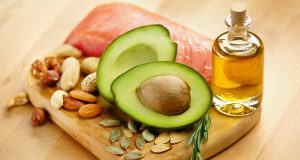Food fuels the body. It can also heal the body, and now research is showing that certain foods can even extend the length (and quality) of our lives! Berries, olives, fish, vegetables, dairy, nuts, and whole grains have all been touted as life-extenders.
Fresh berries like strawberries, raspberries, blueberries, and blackberries are packed with antioxidants, and have a lower glycemic index than most other fresh fruits. Blueberries in particular are great for life-long health due to their off-the-charts antioxidant content. Their high levels of Vitamin C and fiber also make blueberries natural stress relievers for the brain.
The combination of the monounsaturated fatty oleic acid and protective phytonutrients in olives combine to provide serious anti-inflammatory power, helping to combat chronic health conditions like cancer, heart disease, and osteoporosis.
Olives contain yet another health superpower – antioxidants! Antioxidants are free-radical fighting masters, protecting the body from environmental damage. One main antioxidant found in olives is Vitamin E.
Vitamin E improves glucose control and helps to protect blood vessels and nerves from free-radical damage. Some studies have also shown that high doses of vitamin E may even reverse diabetic nerve damage, along with reducing risk for diabetes related cataracts and arteriosclerosis.
Make sure you choose the highest quality olive oil to reap these benefits!
The high omega-3 fatty acid content in cold-water fish like salmon, sardines and mackerel can help to lower LDL cholesterol and triglyceride levels. This, in turn, can help to balance your blood sugar levels, and reduce risk of heart disease.
Think of fish as brain food, too! Those same fatty acids keep your brain running in tip-top shape, improving cognition, memory, and focus. These same fatty acids also help prevent the development of cancer cells and have even been shown to kill them.
Be cautious of the type of fresh fish you purchase. The above benefits can be found in wild-caught fish. Benefits decrease and potential health dangers increase when you choose farm-raised varieties.
Research has shown that eating veggies like romaine lettuce, kale, and Swiss chard on a regular basis can help reduce risk for dementia. In one study, adults experienced slower mental deterioration after eating one to two servings of leafy, green vegetables every day versus those who ate no vegetables. The study even included other variables like age, family history, and other risk factors. The major benefits are due to vitamins A and K that fight inflammation.
Broccoli’s vitamin K, vitamin C, and folate help to improve memory, and its high fiber content stabilizes blood sugar and keeps you feeling fuller longer. Forget limp broccoli blanketed with “cheese”; broccoli is at its best when added to recipes like Mama Lisa’s Coleslaw. Just shred raw broccoli stalks and mix in, or buy a bag of “broccoli slaw” from your local grocery and follow the recipe from there.
The high levels of antioxidants, vitamins and minerals in almonds, walnuts, and pecans help to improve focus, alertness, and provide a boost of energy. The vitamin E found in walnuts has also been shown to decrease risk for Alzheimer’s dementia.
As we all know, full-fat dairy milk is a good source of calcium and vitamin D, both of which help to ensure strong bones as we age. Alternative milks like coconut, soy, almonds or cashews are good options for those who cannot (or don’t prefer to) drink dairy milk.
When selecting dairy products like milk, cheese, and butter always be sure to choose the full-fat option. This is crucial for diabetics as the less fat a food contains, the more sugar has been added!
For example, full-fat yogurt contains approximately 11 grams of carbohydrates/sugar per serving. Low-fat yogurt contains upwards of 17 grams of carbohydrates/sugar. That’s a 50% increase in sugar content!
There are carbohydrates (known as complex carbs) that have less of an impact on blood sugar. Complex carbs are converted into sugar more slowly, giving the body a better chance to regulate the amount of sugar in the blood. Whole grains fall into the complex carbohydrate category.
For example, instead of a plain piece of white bread toast for breakfast, try a slice of toasted whole grain bread topped with a slice of cheese, an egg and a few slices of avocado. (If you’re feeling spicy, add some Sriracha!) The combo of whole grain, protein, and fiber will keep your tummy full and your blood sugar down for hours!
Who wouldn’t want the opportunity to live longer and better by eating fresh, delicious foods? Count us in!
Sources:
https://www.webmd.com/healthy-aging/over-50-nutrition-17/slideshow-nutrition-longevity
 Diabetic Kitchen
Diabetic Kitchen





2 comments
Pingback: Fiber Lowers Blood Sugar - But Are You Eating Enough?
Pingback: Fiber Helps The Body Fight Diabetes - Here's How!